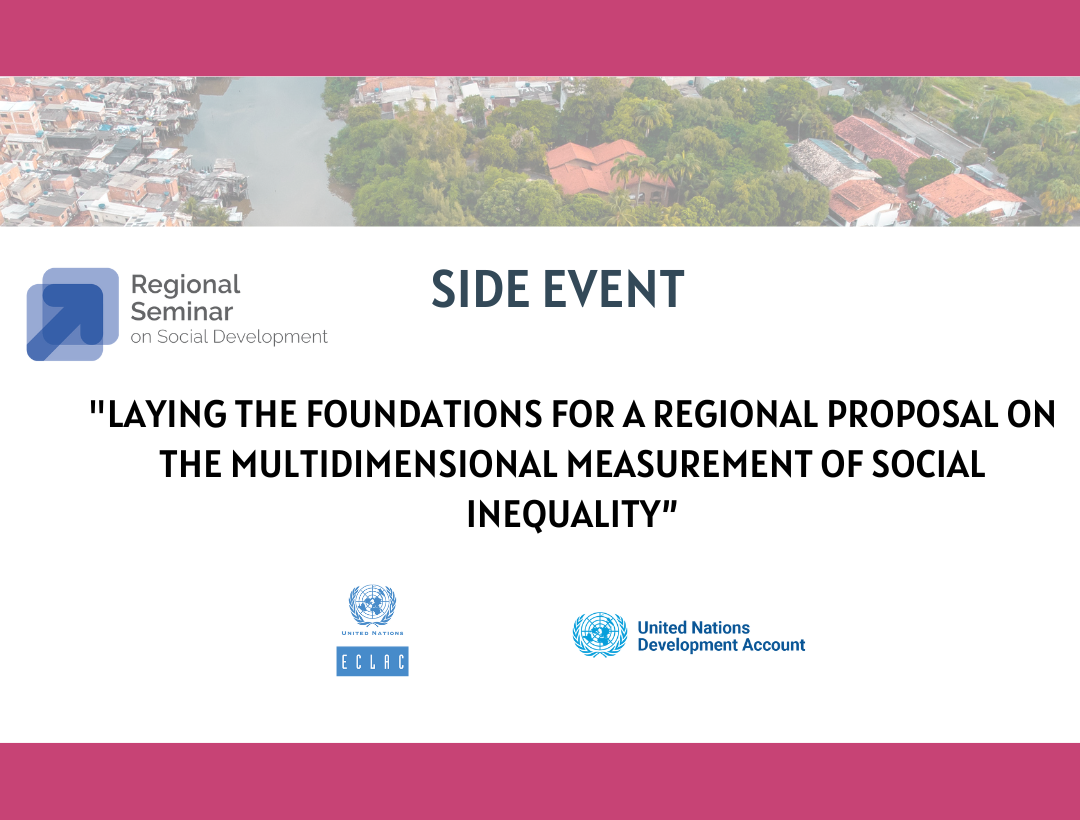Side Event "Laying the Foundations for a Regional Proposal on the Multidimensional Measurement of Social Inequality”
Work area(s)
Topic(s)
Event information

Date
24 Jun 2025, 13:00 - 14:30Event type
Latin America and the Caribbean is one of the most unequal regions in the world, not only in terms of income but also across multiple dimensions of well-being, such as education, health, employment, housing, and access to basic services. These inequalities tend to accumulate and reinforce each other, disproportionately affecting historically excluded groups such as women, indigenous peoples, people of African descent, and rural populations. ECLAC has conceptualised this reality through the 'matrix of social inequality', which highlights how different dimensions of well-being interact with structural axes such as gender, ethnicity, age, and territory, resulting in a complex web of persistent inequalities.
This dynamic of accumulated disadvantages constitutes what ECLAC has termed the 'trap of high inequality': a vicious cycle wherein multidimensional gaps reduce social mobility, weaken cohesion, and constrain sustainable development capacities in the region. The persistence of this trap is explained by at least six interrelated structural factors: (i) low economic growth, resulting in segmented labour markets with high levels of informality and significant productivity disparities; (ii) regressive tax systems, which limit states' redistributive capacities; (iii) weak and insufficiently universal social and protection policies; (iv) low-quality and highly segmented education systems, which hinder social mobility; (v) persistent gender inequalities that affect access to income, employment, and decision-making spaces; and (vi) high levels of inequality and spatial segregation in urban areas, where the majority of the region's population resides.
Overcoming this trap requires rethinking public policies from an integrated perspective, with tools capable of simultaneously addressing the multiple dimensions of inequality. In this context, the objective of this side event is to create a space for reflection and dialogue on the conceptual and methodological challenges posed by the multidimensional measurement of social inequality in Latin America and the Caribbean, as well as to discuss the potential of moving towards a regional measurement proposal. This side event aims to initiate the conversation in order to lay the foundations for building technical and political consensus towards the development of more comprehensive indicators, capable of guiding public policies aimed at reducing social inequality in all its forms.
Practical information
Room: Enrique Iglesias
Language: Spanish (simultaneous interpretation to english)
Schedule
Moderation Daniela Trucco, Senior Social Affairs Officer, ECLAC.
Opening Remarks Alberto Arenas de Mesa, Director of the Social Development Division, ECLAC.
Main Presentation
- Andrés Espejo, Economic Affairs Officer, ECLAC
- José Joaquín Prieto, ECLAC Consultant
Comments
- James Foster, Professor of Economics and International Affairs, George Washington University
- Sukti Dasgupta, Director of the Conditions of Work and Equality Department, ILO
Questions and comments (5 min.)

